7 Benefits of AI in Marketing to Transform Business Strategy
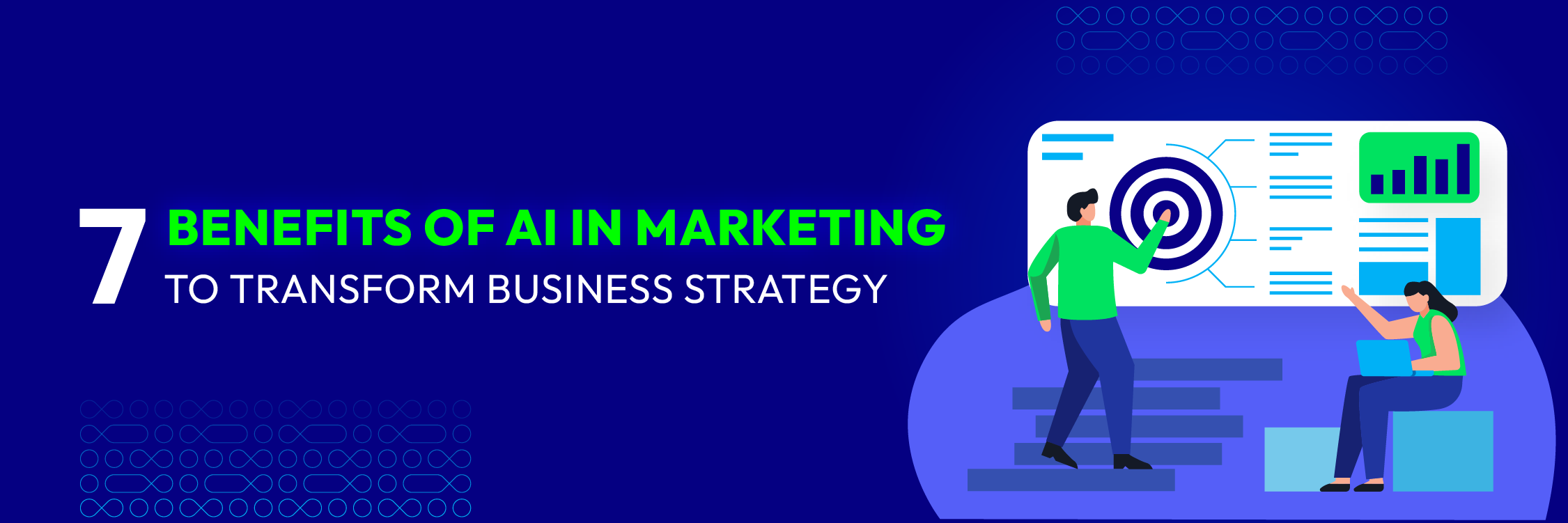
Technology has unquestionably streamlined our lives, taking over many tasks that once required manual effort and completing them automatically and efficiently. Artificial Intelligence (AI) has been a predominant force globally, facilitating various aspects of daily life, from providing optimized search results to managing business transactions.
According to a recent study conducted by Price Waterhouse Cooper (PwC), the global economy stands to gain USD 15.7 trillion by 2030 due to the impact of artificial intelligence (AI). Additionally, local economies could experience a significant uplift, with estimates suggesting a boost of up to 26% of GDP from AI by 2030. While these projections highlight AI’s broad economic influence, the question remains: What is AI’s potential specifically within the field of marketing?
This article aims to explore the essence of artificial intelligence and its implications for online marketing and advertising.
What Is Artificial Intelligence?
Artificial intelligence encompasses a broad field within computer science focused on creating intelligent machines capable of performing tasks typically requiring human intelligence.
Furthermore, AI aims to develop systems endowed with human-like cognitive abilities, such as reasoning, understanding context, generalization, and learning from past experiences.

AI systems typically operate by ingesting extensive amounts of labeled training data, analyzing it to identify patterns and correlations, and utilizing these insights to make predictions or forecasts about potential outcomes.
For instance, an image recognition program can be trained to identify and describe objects in images by studying millions of examples, while a chatbot equipped with text chat samples can learn to engage in realistic conversations with people.
What is AI Marketing?
AI marketing involves leveraging AI capabilities such as data collection, data-driven analysis, natural language processing (NLP), and machine learning (ML) to gather customer insights and automate essential marketing processes. Presently, AI technologies are extensively employed to generate content, enhance customer experiences, and provide precise outcomes. Prior to selecting an AI tool, organizations should thoroughly investigate the various types of AI marketing applications accessible and examine their utilization by other businesses.
8 Benefits of Using AI in Digital Marketing
Now that we have an understanding of what artificial intelligence entails, let’s delve into its effects on online marketing and advertising.
While this compilation isn’t comprehensive, as advancements in AI are ongoing and continually enhancing digital marketing practices, there are 8 key advantages that digital marketers can currently harness by integrating AI into their strategies.
1. Predict Customer Behavior
Identifying potential customers who are most likely to engage with your offerings can be a resource-intensive task. However, leveraging AI systems enables marketers to sift through diverse audience segments and pinpoint prospects with higher responsiveness to their offers. By employing AI tools equipped with decision trees and machine learning models, marketers can analyze past data to discern patterns in customer behavior. These insights inform the development of targeted digital marketing strategies aligned with specific objectives, such as increased conversion rates or website traffic.
2. Analyze Customer Engagements
Measuring customer engagements is vital for gauging campaign effectiveness and optimizing marketing efforts. AI tools facilitate in-depth analysis of customer interactions across various campaigns, enabling marketers to identify target segments more accurately. By comparing data on both new and existing customers, AI empowers marketers to cultivate repeat business and enhance customer experiences. Additionally, AI-driven insights provide valuable information on customer preferences, aiding in more effective targeting and engagement strategies.
3. Precisely Target Customers
Personalized marketing campaigns are more persuasive than generic advertisements. AI-powered predictive consumer segmentation enables marketers to tailor their messaging to specific audience segments, increasing the effectiveness of targeted marketing efforts. By leveraging AI, marketers can utilize personalized data to anticipate consumer interests and preferences, optimizing ad targeting and enhancing conversion rates.
4. Automate Marketing Process
In an era where optimizing marketing workflows is crucial, employing an AI-driven scheduling assistant can significantly enhance efficiency. An AI meeting assistant not only enhances time management but also ensures smoother collaboration across departments. Automated scheduling assistants enable brands to streamline meeting arrangements and manage time more effectively, ensuring marketers can focus on strategic tasks instead of logistical details. AI streamlines digital marketing processes by automating tasks while maintaining audience targeting precision. Automation coupled with AI-driven personalization enables marketers to achieve a high level of customization in their marketing strategies. From automating PPC ads and SEO to managing social media marketing and keyword research, AI empowers businesses to streamline marketing efforts and gain a competitive edge in a rapidly evolving market landscape.
5. Enhance Customer Relationship Management
AI plays a pivotal role in customer relationship management by providing real-time insights into customer interactions across various communication channels. Automated processes, such as chatbots and AI virtual receptionists, can efficiently handle customer inquiries while statistical models help determine optimal support strategies. Integrating AI-driven technologies into customer service platforms enhances user experiences and fosters brand loyalty. Moreover, AI-powered analytics enable businesses to identify potential loyal customers and tailor promotional strategies accordingly.
6. Optimize Marketing Content
Delivering the right message to the right audience at the right time is crucial for marketing success. AI facilitates this process by analyzing vast amounts of data to identify content topics likely to resonate with target audiences. By leveraging AI-driven insights, marketers can create optimized marketing content that aligns with audience preferences and enhances engagement.
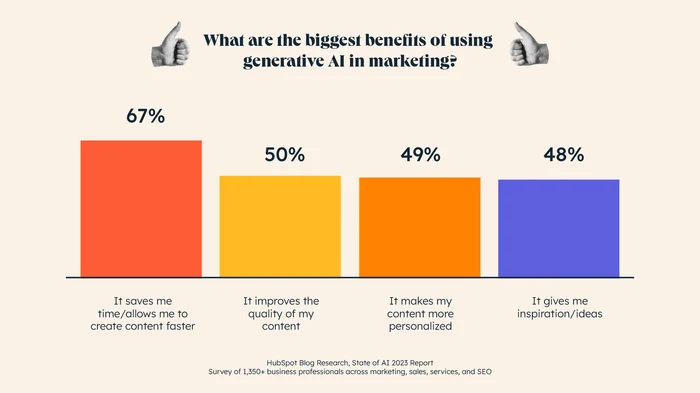
According to a survey by HubSpot, 49% of marketers acknowledge that the most significant advantage of AI lies in its capacity to generate more personalized content. For instance, platforms like Netflix harness AI to scrutinize viewers’ preferences and watch history. This analysis enables the platform to offer tailored recommendations that align closely with each individual customer’s distinct tastes and preferences.
This approach ensures that marketing messages are well-received and contribute to overall campaign effectiveness.
7. Generate New Ideas
AI empowers marketers with swift access to innovative ideas. Also according to HubSpot, 48% of them cite the primary advantage of AI as its capability to generate novel ideas.
Utilizing AI-driven chatbots like ChatGPT, Jasper AI, and HubSpot’s Content Assistant, marketers can effortlessly brainstorm new marketing campaigns, craft product descriptions, and explore fresh blog topics. For instance, a marketer can input brand details, target audience, and campaign goals into a chatbot to generate catchy tagline ideas quickly.
Furthermore, AI can refine ideas by analyzing market data and consumer feedback. By inputting customer reviews into a chatbot, marketers can identify trends to enhance marketing strategies and product descriptions effectively.
How to Use AI in Your Digital Marketing Strategy
Artificial intelligence has undoubtedly revolutionized various aspects of business operations, particularly in marketing.
Follow these five steps to effectively integrate AI into your upcoming marketing campaign:
Step 1: Define Goals
Begin by establishing clear goals and expectations for the campaign. Reflect on past experiences to identify areas for improvement and outline how AI can enhance future results. Align stakeholders on objectives and set meaningful key performance metrics (KPIs) to gauge success.
Step 2: Secure Talent
While data scientists and AI experts may not traditionally reside within marketing teams, their expertise is vital for AI-driven initiatives. Organizations can either invest in hiring such talent or opt for third-party vendors to assist with training and maintaining AI tools. Consider the level of investment suitable for your organization’s needs.
Step 3: Ensure Data Privacy Compliance
Adhere to data privacy laws throughout the implementation of AI marketing solutions. Safeguard customer data during training and usage phases to avoid potential legal ramifications and fines.
Step 4: Validate Data Quality
The effectiveness of AI marketing tools relies on the accuracy and relevance of the data they analyze. Ensure that the data used for training accurately reflects customer intentions to derive meaningful insights and strategic recommendations. Prioritize data quality to optimize marketing outcomes.
Step 5: Select the Right Solution
With goals defined, talent secured, data privacy ensured, and data quality validated, organizations can confidently choose the AI solution that best aligns with their needs. Evaluate various platforms and capabilities to find the optimal tool for achieving marketing objectives.
Best AI Marketing Tools for Your Business
Artificial intelligence has undeniably revolutionized various aspects of business operations, particularly marketing.
With AI tools, companies can now efficiently target a vast number of audiences by discerning trends and preferences, ultimately garnering the attention their brand deserves. Here are 5 AI marketing tools to consider:
Jasper.ai
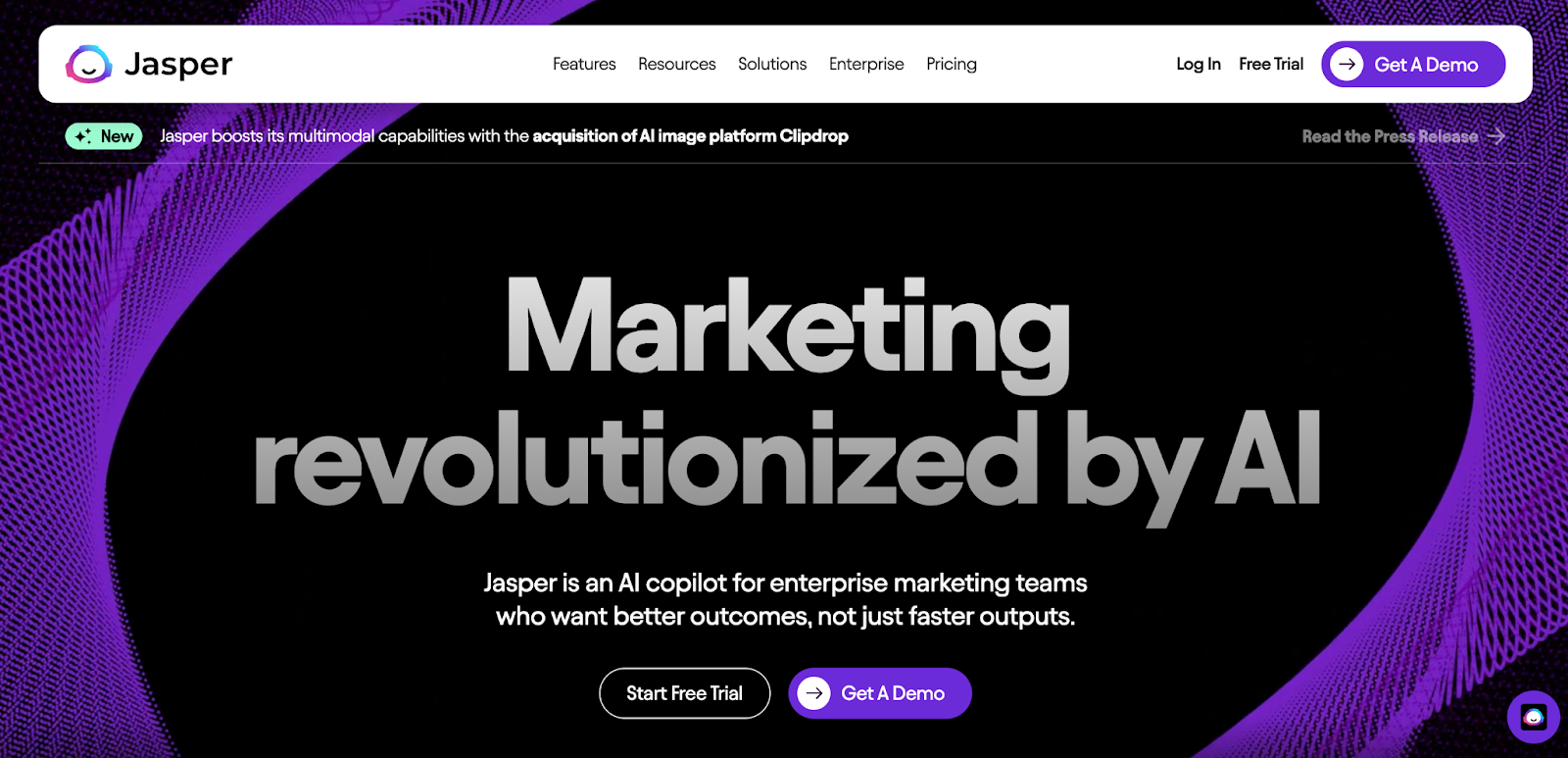
Jasper.ai is an AI-powered tool tailored for content creators, marketers, and ecommerce businesses. Specializing in copywriting and content strategy, Jasper AI utilizes advanced algorithms to swiftly generate high-quality content such as product descriptions, ad copy, and social media content. Its predictive analytics capabilities enable marketers to anticipate customer preferences and behaviors, facilitating the creation of highly targeted campaigns.
Key features:
-
Real-time customization of brand voice
-
Trending topics identification
-
AI chat feature
-
Contextual and sentiment-based support
-
Plagiarism detection
Pricing:
-
Creator Plan: $39/month/seat
-
Pro Plan: $59/month/seat
-
Business Plans: Contact Sales
Grammarly

Grammarly is an AI-based typing assistant that comprehensively reviews spelling, grammar, punctuation, clarity, engagement, and more. Renowned for its advanced grammar checking, plagiarism detection, and error-free verification, Grammarly is particularly effective in refining product descriptions, marketing copy, and communications.
Key features:
-
Sophisticated grammar and spelling verification.
-
Suggestions for enriching vocabulary.
-
Enhancements for writing style and clarity.
-
Detection of plagiarism.
-
Identification of tone and suggested adjustments.
-
Validation for consistency and coherence.
-
Recommendations for genre-specific writing (academic, business, creative, etc.).
Pricing:
-
Free Plan
-
Premium Plan: $12/month
-
Business Plan: $15/month
Undetectable AI
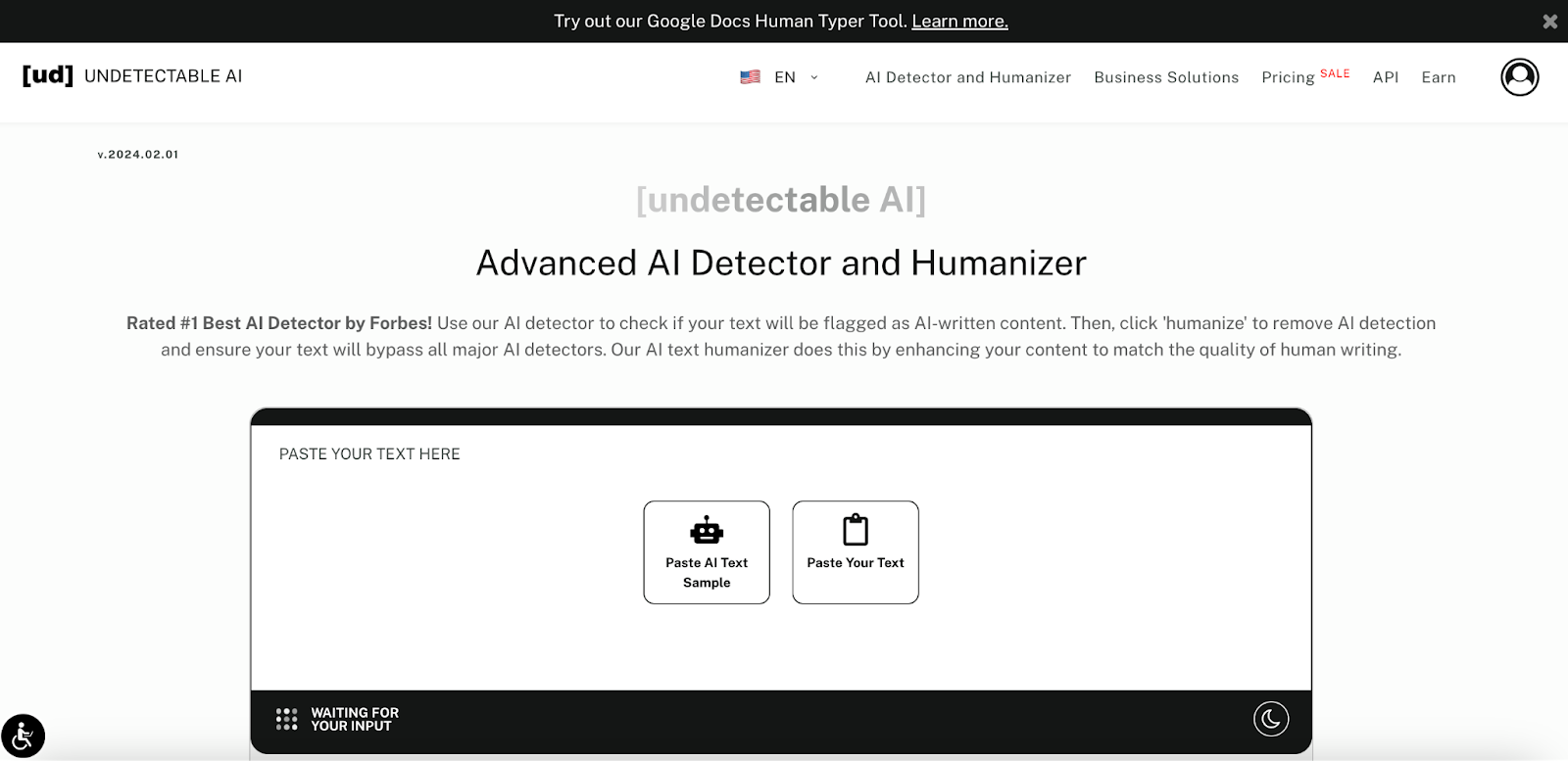
This tool specializes in rewriting content generated by AI, ensuring it sounds human. Undetectable.ai refines content from AI-content generators like ChatGPT, transforming it into human-like language. Although errors may occur, it offers a solution to maintain a natural tone in AI-generated content.
Key features:
-
Adjust the readability level of your writing
-
Create niche rewrites according to the intended purpose of your writing
-
Decide how much you want to change your writing
-
Watermark free and future proof
Pricing:
-
Monthly: $14.99/month
-
Yearly: $10/month
-
Business Plan: Contact for more
AdScale AI Advertising Platform
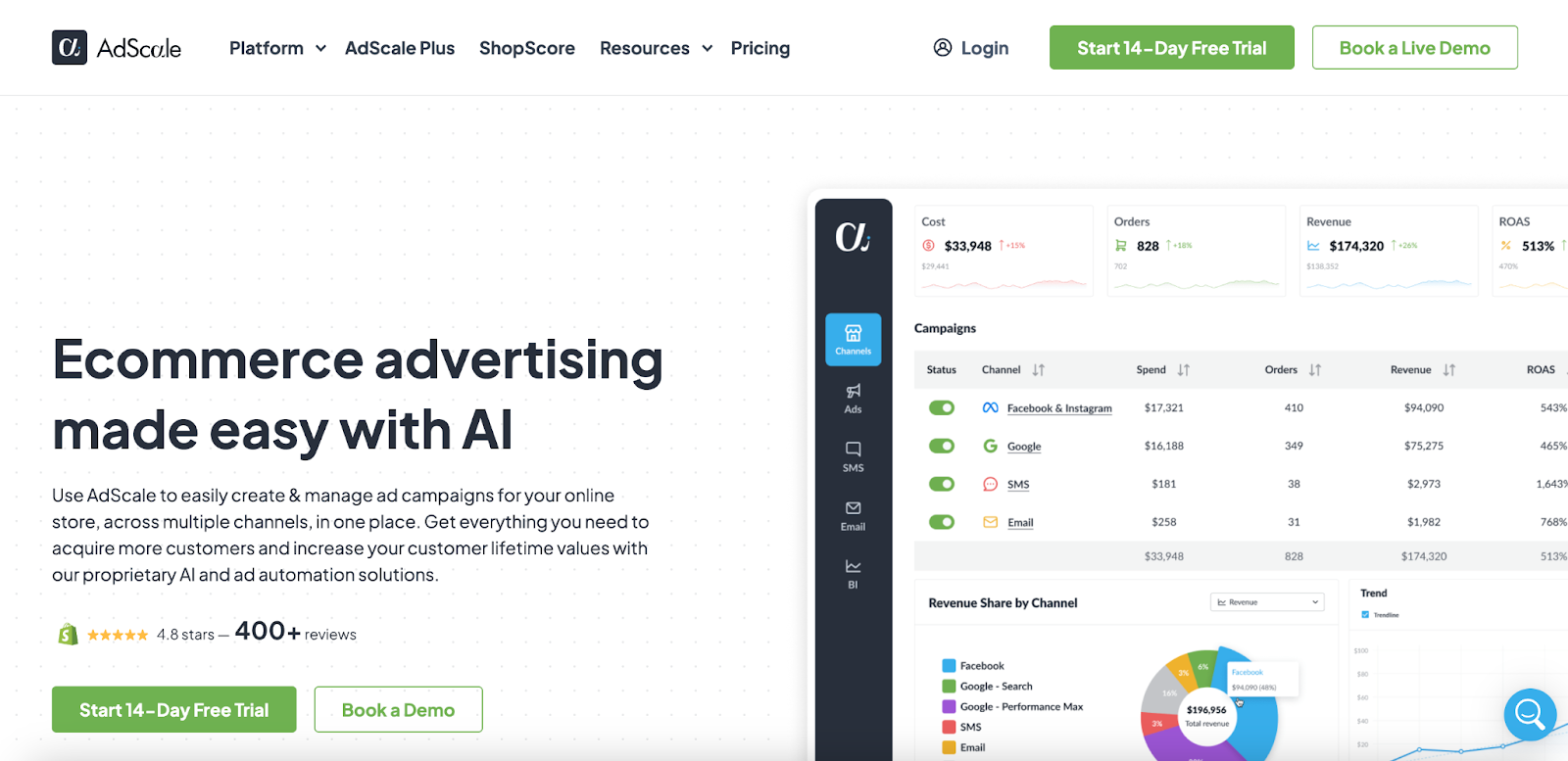
AdScale is an AI advertising platform aimed at helping digital marketers optimize advertising performance across multiple channels, including Google Search, Google Shopping, Google Display, Facebook, and Instagram. Through machine learning, AdScale automates and optimizes ad campaigns, from creation to targeting and bidding, while providing real-time data analysis for quick adjustments and improvements.
Key features:
-
Automated ad management
-
Data-driven campaigns
-
Rich analytics and insights
-
Personalized SMS & email marketing
-
Integrated advertising channels
Pricing:
-
14-day free trial
-
Paid plan: $112/month billed annually
Aidaptive AI Intelligence Platform
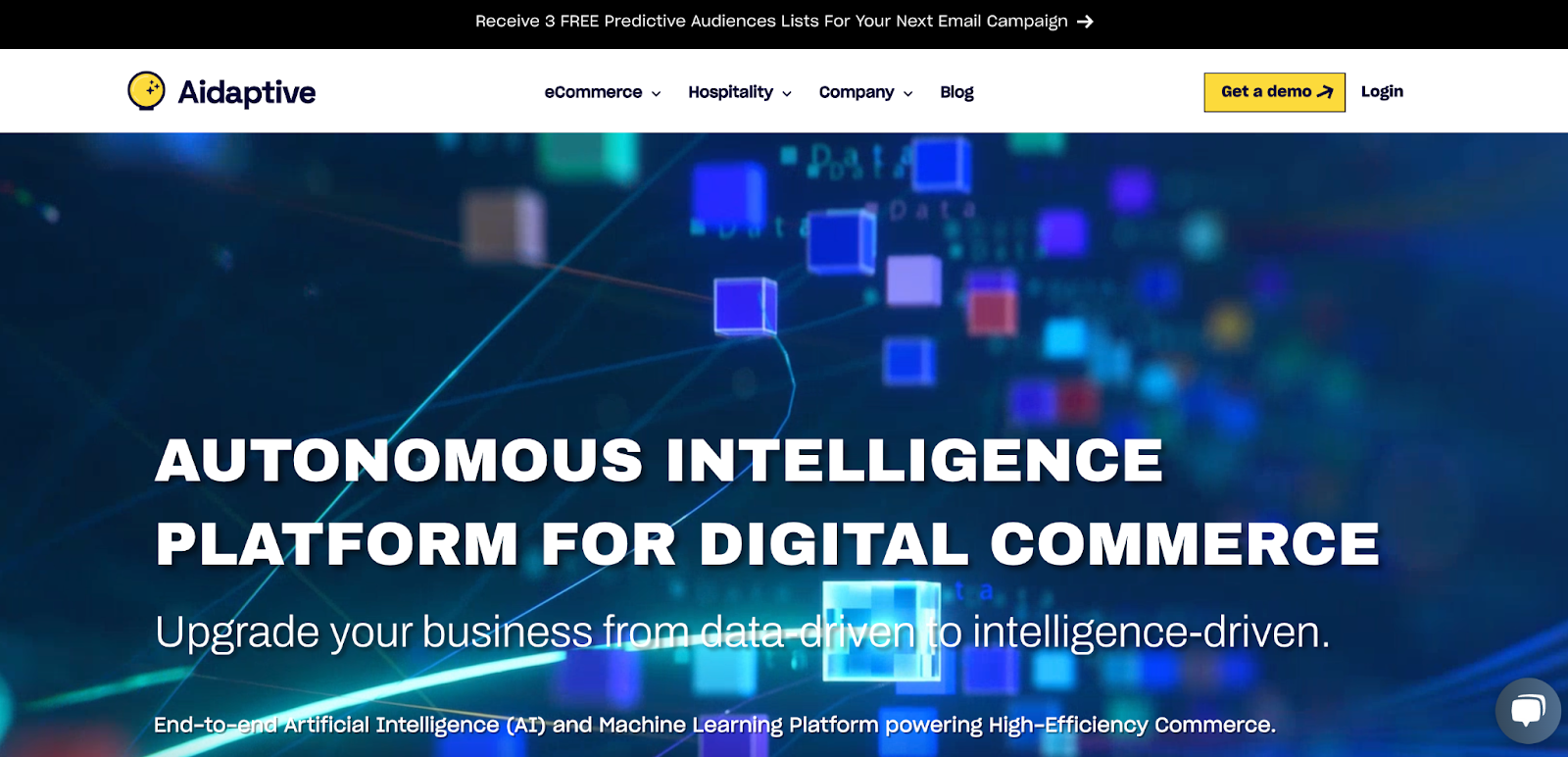
Aidaptive is an intelligent platform crafted to offer customized shopping experiences to online shoppers. By employing machine learning algorithms, Aidaptive enhances ecommerce websites and enhances conversion rates. It offers tailored product suggestions and dynamic pricing tactics, ensuring a personalized journey for each visitor.
Key features:
-
Predictive recommendations
-
Fully automated system
-
Enterprise-grade AI
-
Omnichannel deployment
Pricing: Schedule a demo with Aidaptive’s personalization specialists upon request.
Conclusion
In conclusion, artificial intelligence (AI) has transformed marketing, providing numerous benefits for businesses. From streamlining processes to optimizing content creation and targeting, AI offers opportunities to enhance strategies and drive growth. As AI continues to evolve, leveraging its potential can lead to transformative results, positioning businesses for success in the digital age.





